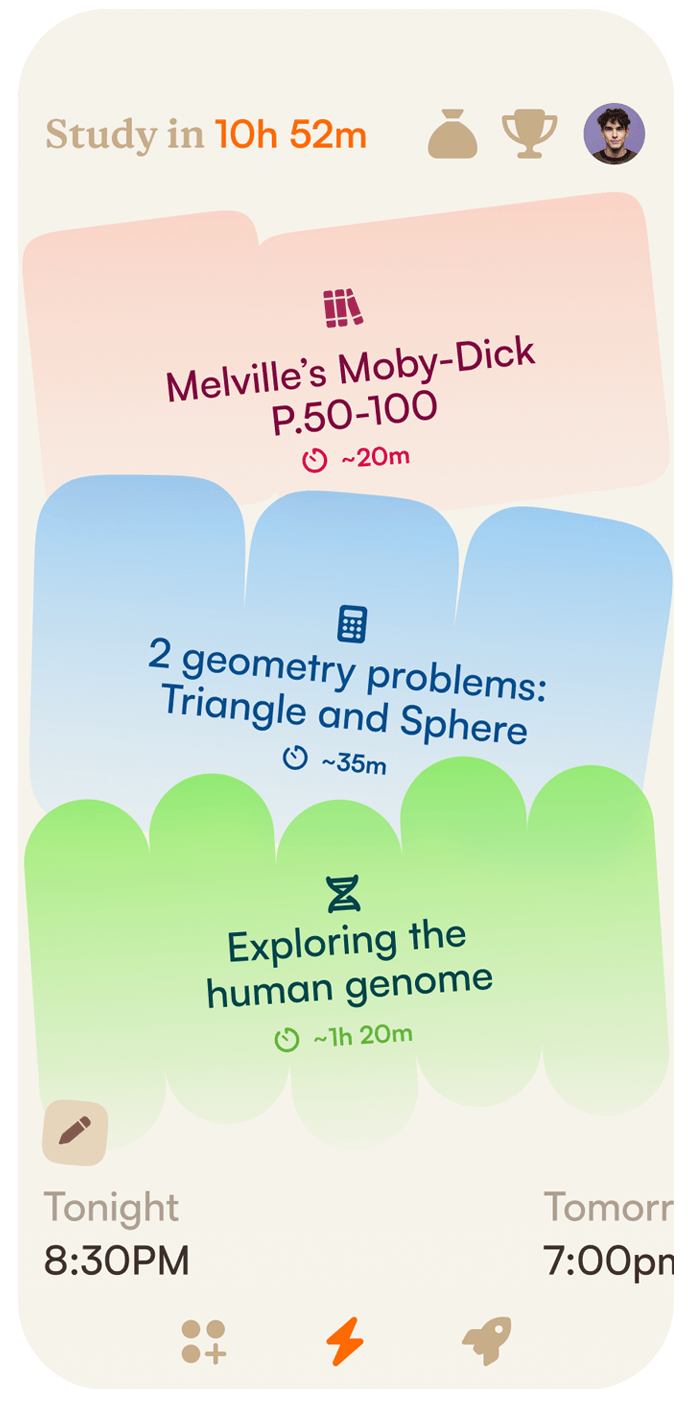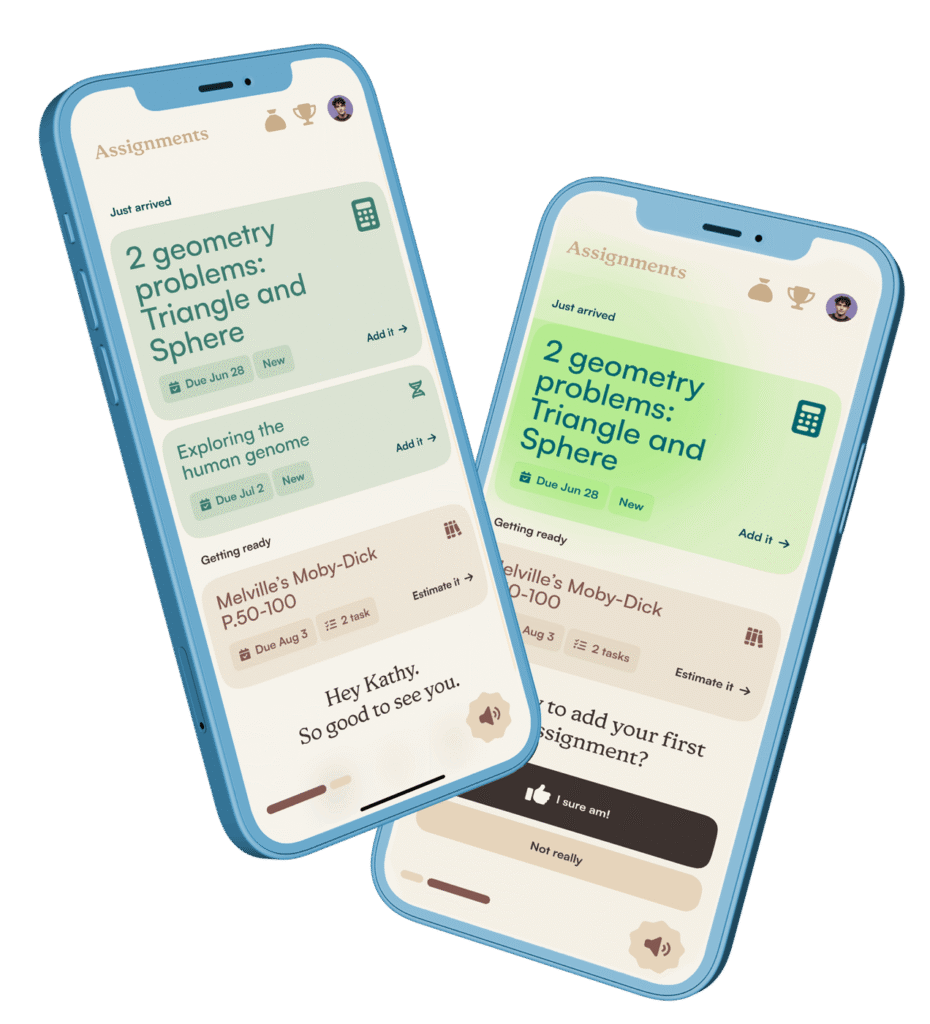Education's Missing
Piece!
All while removing the academic burden from families!
Uluru unlocks
motivation and
agency for all learners!
Trusted by families at schools like…




Learn about our complimentary accounts!
How Uluru creates confident, self-directed learners

Students who are more engaged and less anxious
Anticipation
Uluru keeps students’ assignments top of mind. This is especially useful when they are learning how to manage much larger projects that take place over a longer period of time, or which are due further into the future.
Read More
Uluru does this by externalizing the processes related to future oriented behavior. It encourages students to look ahead and then create plans by selecting and prioritizing, and then guides them throughout as they execute each phase.
For example, if a student receives an assignment at the beginning of the month, but it’s not due until the end of the month, Uluru helps that student to create more context and anticipate how difficult that assignment may be. Then it guides them how to break down those tasks over the entire month, so they don’t wait until the last minute, or get surprised.
Organization & sequencing
Typically, when people think about teaching organization to students, it starts with introducing calendars or checklists.
Read More
While that is well-intentioned, those are simply tools, yet most students still lack the skillset necessary to use them effectively. Uluru helps build these skills by guiding and encouraging students to reflect and organize their schedules, daily. During this process, Uluru guides students to create the steps necessary to initiate and complete each assignment and task in the most efficient manner. These sequencing habits are crucial for student development, and Uluru makes it easy to practice and reinforce in real-time.
For example, students are encouraged to decide which assignments to prioritize, especially helpful when there are multiple assignments to complete in a single night. They then organize those assignments within their study block in the order they prefer. During that process, students are encouraged to think about the types of skills needed to successfully approach the assignment (i.e., fiction reading for literature, or problem solving for math), and then carefully dissect and break down tasks to ensure full completion.
Goal selection
Learning how to select a goal to give a student the best chance at accomplishing it is a foundational component of goal-directed behavior.
Read More
Uluru encourages students to set time and completion goals for all assignments they must complete, all with no involvement from the family. Students start to feel more independent and in control, immediately, and all parents need to do is cheerlead and motivate.
For example, students are given the opportunity each night to select and prioritize assignments when they compose their nightly study sessions. This continuous reinforcement is what builds discipline and develops good habits.
Time forecasting
Nothing builds self-awareness more readily than an understanding of how much time a particular task may take.
Read More
Uluru scaffolds students ability to more accurately estimate time by encouraging students to estimate how long an assignment may take, and then compare that to how much time actually elapsed after a task was completed. The immediacy of this feedback provides a consistent measure against which they can compare their progress, which helps them learn, adapt, and improve over time. Kind of like a video game! Reinforcing this skill is essential for students to become better planners and develop greater autonomy. Really preparing students for college and beyond.
For example, after a students view and prepare each assignment, Uluru asks the students to estimate how much time they think it may take them, while also suggesting an estimate for them. Over time, Uluru helps students track and compare their times on particular subjects, activities, and tasks. So the more feedback Uluru provides, the more accurate students will become, which will make them even better at planning and and pacing their study time. Thus, making them more confident when they are faced with more difficult assignments.
Progress monitoring
Uluru automatically reinforces progress monitoring habits within a students’ work time.
Read More
This seamless integration puts students in the driver’s seat, which continues to scaffold that autonomy to which everyone aspires. Students are encouraged to set timers, and monitor their capacity which normalizes the importance of keeping track and staying flexible.
For example, students are always encouraged to start a timer when they begin work, and to pause it if they need to take breaks. Learning how to monitor progress independently is one of the fastest ways to create more self-directed learners.
Set shifting
As students get older, not only does the rigor of their academic content grow, but so do their responsibilities in juggling a myriad of projects, and assignments.
Read More
Executing on each of these individual duties is hard enough, more difficult still is learning how to navigate between the combination of constantly changing daily challenges. Most students have a preferred subject, or a topic they find easier than another. Yet, they may need to address their preference, and something they hate in the same day. Set shifting refers to this type of transition, and refers to the difficulty such a transition may present. Over time, Uluru will help students prepare more effectively to ease set-shifting, and understand why some transitions may be more difficult than others.
Response inhibition
In order for students to build the cognitive stamina to do “harder things”, they must build up the patience necessary to execute effectively.
Read More
Tasks that require a lot of self-regulation drain cognitive abilities, and place students in situations where their normal (habitual) responses are in conflict with the new rules or newly learned knowledge that is actually needed to accomplish the harder task. Uluru scaffolds students’ abilities to resist using their old habits and instead use new ways to successfully approach, and internalize what works for the new scenario.
Motivation
There are two types of motivation: intrinsic (internal) and extrinsic (external). In order for a student to develop a high sense of self-relevance and autonomy they must learn to exercise a good dose of intrinsic motivation.
Read More
One of the best ways to help students develop intrinsic motivation is to first use extrinsic rewards and positive reinforcement. Uluru offers a way for families to consistently offer reward, and positive feedback in real-time by providing insights into a students’ progress and skills exercised during tasks. A scientifically sound method to help students to become more self-directed.
Students Want Agency and Autonomy!
Struggles usually manifest when rigor increases and students lack the organization, and time management skills necessary to overcome feeling bogged down. The more academics and social responsibilities pile up, or the further behind a student falls, the higher their anxiety increases, and the more disengaged they become. All things that decrease cognitive stamina leading to poorer school engagement.



- Uluru supports students through the entire “life cycle” of assignments.
- It continuously reinforces the necessary skills and encourages students to transfer them to more rigorous responsibilities.
- Uluru provides parents consistent feedback for student progress not simply related to grades.
How Does It Work?
Uluru is not something extra for your students to do. It seamlessly builds their skills within their existing workload.
1. LMS Integrations
Uluru is a developer partner for all of the leading LMS companies. Uluru integrates with students’ LMS connections in order to supercharge their existing academic assignments, transforming them into important executive function guidance opportunities. It retrieves the assignment listings or projects their teachers assign.
2. Assignment Preparation
Uluru begins the process of guiding students to apply researched backed strategies to schedule their workload, initiate tasks, and reach out for help if needed. You know, all the things students hate for parents to check-in about, but also the things they need the most help with in order to develop agency.
3. Parental Notifications
Throughout the entire execution guidance process, automatic notifications are delivered to parents to give them insights on progress, and the ability to positively reinforce or reward students for their process, in real-time. So families no longer need to be homework enforcers, and instead become their students’ hype squad!
4. Self-awareness & Time management
During the execution guidance, Uluru improves students’ time management and self-awareness by encouraging students to estimate and progress monitor. Over time Uluru helps students discover more about their preferences and capacities by allowing them to compare past outcomes to make them more confident in their future decisions, and to avoid situations where procrastination and frustration may set in.
5. Focused Study Mode
Uluru’s study mode offers students the ability to monitor progress, encourages students to take intentional breaks, normalizes feelings of frustrations during difficult tasks and advises them to advocate to their teachers if they need help, or are confused.
6. External Reminders
Research shows that externalizing reminders for a newly learned process or behavior is essential to achieving fluency or internalizing said behavior. This is built into the foundation for all skills a student learns within Uluru. Students will never get caught off guard with Uluru’s help. They’ll have less fear of messing up, while also creating the space and opportunity to learn the necessary skills to prevent anxiety and negative school emotions.
Uluru Complimentary Account!
Uluru complimentary accounts grant full access to our growing library of videos digital resources and monthly newsletter. At no cost!
These accounts are perfect for families who want to learn more, or those who want assistance with connecting Uluru with their school. Don’t worry, you can always purchase student subscriptions when you’re ready. After you register you’ll have immediate access to your dashboard, and you may begin watching our first video series with Owen Lewis, MD, child psychiatrist and professor at Columbia University.
How Does Uluru Compare?
In-person therapy/coaching
9 hours / month
$4,475 / month
$44,750 / year
- Executive function coaching
- Session specific planning and monitoring
Online coaching/tutoring
9 hours / month
$2,025 / month
$20,250 / year
- Executive function coaching
- Session specific planning and monitoring
Uluru subscription - Uluru works anytime.
Unlimited support
$33 - $75 / month
$399 - $899 / year
- Real time executive function coaching
- Interactive planning & progress monitoring
- Daily reflection & goal setting
- Parental notifications & dashboard
- Works 24/7
Resources
Explore more videos about Uluru
Explore more articles in our blog!

FAQs
What does Uluru cost?
Uluru costs $899/yr for the first student in each family, and $399/yr for each additional student.
Is parent permission required?
Yes. Parents must register for an Uluru account or accept their child’s invite to join.
What does the Uluru app do?
Uluru guides students through a step-by-step process of planning, initiating, and focusing on tasks to help them complete homework assignments on time.
What grades can use Uluru?
Uluru is for students in grades 6 and above.
Do teachers need to access Uluru?
No. Teachers simply post assignments to their learning management systems (such as Google Classroom, Blackbaud, and Schoology) as usual.
Do you have more questions?
Parents, please connect with us if you need more information before signing up.
Or, if you are an educator or school leader who wants to explore rolling Uluru out to all of your families, get in touch!

